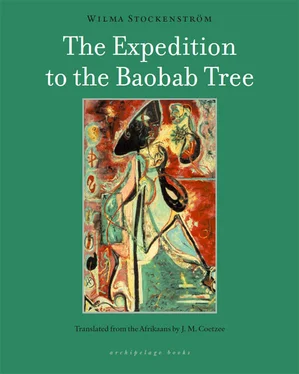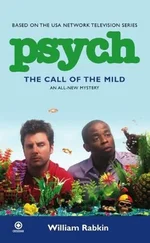In my perfect arms he died, supported between my perfect thighs, leaning against my perfect breasts, he and I, father, mother, child, owner, valued art object and servant, lovers.
It had happened too long ago to wish to hate him. There was no time to hate anyone and plan revenge. The veld threatened us. I turned back to the stranger whose gentle nature I had also found out about on this interminably long journey to the mirage of a city in a blooming red desert. Where I had earlier allowed myself to be charmed by his wit, I learned during this time to appreciate his humanity and helpfulness. The circumstances were certainly not conducive to deep conversations embroidered with light-hearted thesis and antithesis, and in those days it seldom happened that the two of us spoke together. I think the encircling silence was too great. It compelled our respect. No, it is silly to think so, for in truth we were usually too tired to begin a conversation. I could not deny that things were going badly for us. We shuffled one behind the other through the hot region, our tired gaze measured the distance to the next spot of coolness and the relief of a roof of leaves, and though we knew we could not afford it, we lingered longer and longer in this way in the shadows of trees. Like now.
We exchanged apologetic looks. I took his hand and pressed his fingers to my mouth.
We had to be going. It was no good. We had to make up our minds. We thought of the alluring city and everything that would be awaiting us there. We filled in the scanty information provided by the hunters with our imagination, and the deeper we went into the interior, the further from home, the more desolate the bush and the slower and more unwilling our bodies, the more richly we festooned the images we had called up. We did not see that we had begun to pretend that what we wanted must exist. We referred to the city as if it were an accomplished fact that we would soon reach it, just another day and another day, just another couple of days and another couple of days, then we would see it lying on the horizon, flat and shining at the foot of mountains consisting of pure rose quartz.
I dreamed of that rose quartz. My dreams were stuffed full of rose quartz. I could barely move among the craggy pieces. The floors of my dreams were rose quartz, the pillars and the ceiling of my dreams. I peered out between the rose quartz at the rest of the world. I withdrew into rose quartz and nodded contentedly.
But first we had to cross the swamp, the hunters had said.
The more burningly I longed to see the city at the foot of the rose quartz mountains, the longer I wanted to postpone the sight of the swamp between. For I did not believe the description of white and green water lilies arranged on dew-clear water wherever you looked, and golden reeds to which the tiniest red and silver painted frogs clung, and spiders that tumbled from the glitter of their webs when the dugouts bent the grass.
I had seen what a swamp looked like when we left the sea behind. I felt its oppressive air upon me and its sharp smell irritated my nostrils. Its endless green expanse stretching into the haze enclosed me. I heard a sucking and a bubbling and saw the snouts of crocodiles lying in the bruised mud. I saw mosquitoes in a mist above the pools. I saw mudskippers creep halfway out to stare boldly at me. And the worst was the silence that I vaguely recognized from earlier on. It was the oppressiveness that had been lying in wait for me on a journey of horror so long ago I should scarcely have been able to report on it. But I recognized this silence. It was the supreme wide silence that prevailed over the noisy croaking of the frogs. The silence had a width of weight that muted your appetite for life and then after a never-ending day tried to press you into the mud and bury you with the wingbeat of night. Was it the immeasurability that made yellow sweat drops burst out on your forehead and disturbed your breathing? I recognized it. There was also fear, a sticky fear that shut off your throat. I recognized the fear. In what ways could I still experience it? I knew the fear of bloodthirstiness and of isolation and of ignorance and of punishment and of bewilderment. I knew him.
This fear was part of the air. It hung as far as the coast where the city of my various owners commenced with shanties and pole fences, with herds of untended goats and spill-off channels full of nightsoil, the busy commercial city to which I was kidnapped.
I had already tried to imagine a kind of existence in which I was not a possession, but it did not come easily to me. What would have become of me in the land of my origin? Would I, for example, have walked, sat, stood differently? Would I have entered into other kinds of friendship, accepted wholly different opinions? Would I have clung to religion? Would I have had a husband, and children by him only? Children I would have raised till they could stand on their own feet? Suddenly I thought: I would have been able to be a grandmother. Grandchildren playing around me in a yard full of tame guineafowl.
Suddenly I saw: here in this city I would never become a grandmother. Here I functioned as a mother till my children were as high as my hip, then I lost all say over them. They disappeared from my life. For me there was no continuation, no links backwards or forwards. There was coming and ending, a finality as if darkness were made abiding. If it had been death, I would have had certainty. Now I did not know.
Where were the children I had brought into life? How would I be able to recognize them if I bumped into them somewhere? And would I be able to recognize them? Sometimes I looked attentively at young faces, searched for myself in their features, their voices, their behavior, their posture — assuming that my children were all here, I thought bitterly, and not sold into service in other cities and countries. I wondered whether I would be able to pick out a child of my own by maternal feeling, no matter where or how we met. Would I know it was he? Would I immediately feel a glow of recognition course through me, and yearn to press him to me, meticulous identification having been rendered unnecessary by a bittersweet knowledge within me, a source of certainty warmer than the sun, like mothers are supposed to have? Mothers being unfathomable, after all.
It had not yet happened. Nor had I yet heard of such cases. But I continued to look into young faces, listen to young talk.
In the house of my benefactor it was part of my duties to amuse his grandchildren when his married daughters or his middle son paid visits with their spouses and children. Such visits occurred often, at any time, unannounced, and I enjoyed the fun. I liked to see the little ones gobble down sweets. I liked it when they clambered up and over me tirelessly, and I liked telling stories; but with the older boys and girls I did not get along as well. I felt strangely embarrassed with them. It was as if I had consciously to sense their attitudes and desires, and as if my lack of intuition were noticeable in my behavior, as if I betrayed my confusion, even as if I were afraid that they would detect a flaw in me which excessive friendliness and affability simply could not disguise. So there remained a distance between us. Fortunately some of them were already provided with their own slave or slave girl to see specifically to their needs, while the slave girls who came along to look after the small children were only too ready to leave the work and fuss to me. And I enjoyed it. I enjoyed wiping dirty little mouths and listening to terrible accusations and finding words of comfort for little hurts and big frights. Hey! Hey! I called — Don’t put finger into the parrot’s cage! Oh no! And I cuddled the little bodies till they were out of breath with delighted laughter.
I felt uneasy when my benefactor caught me doing this. His smile. It did not at all rhyme with the self I tried to be for him, and it was certainly not good for my self-confidence in his bedroom. Abruptly I stopped playing and waited, hanging my head, for him to go.
Читать дальше












